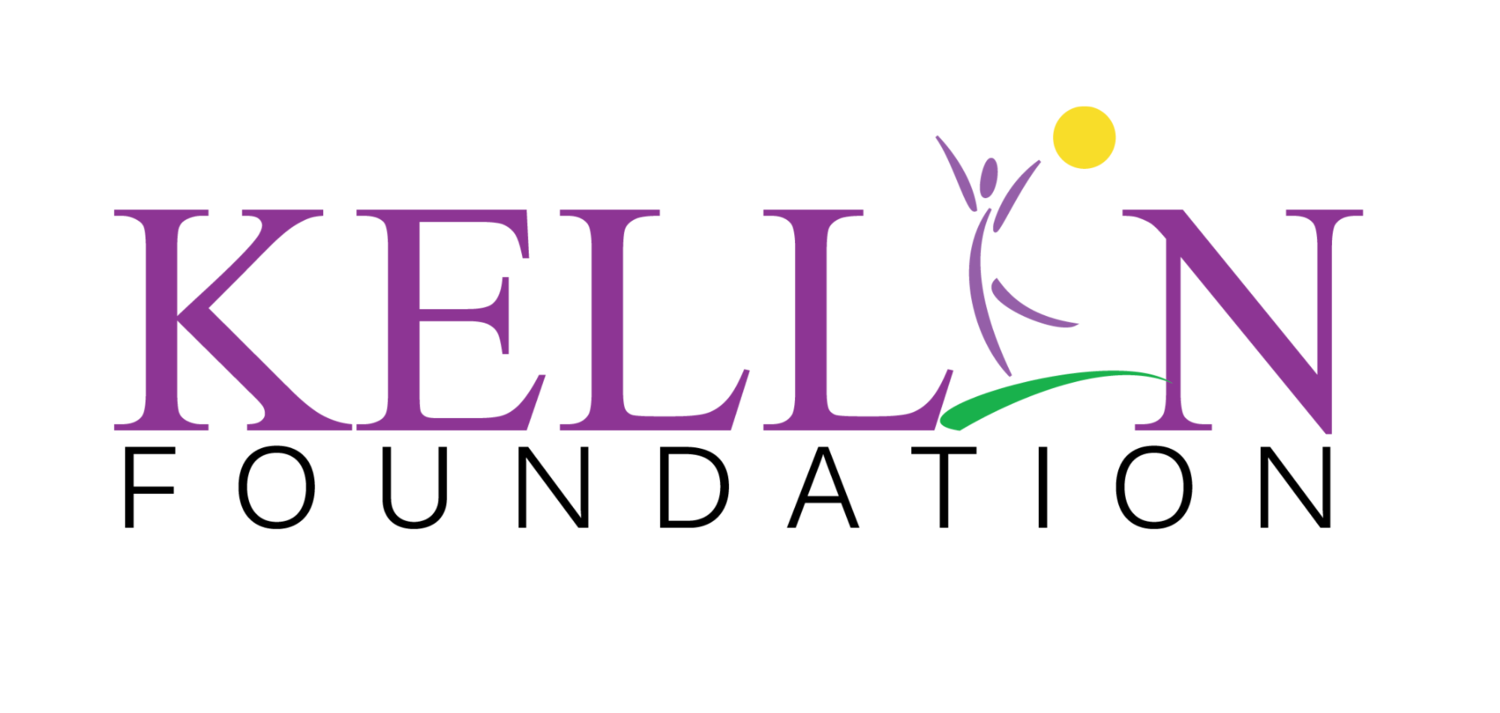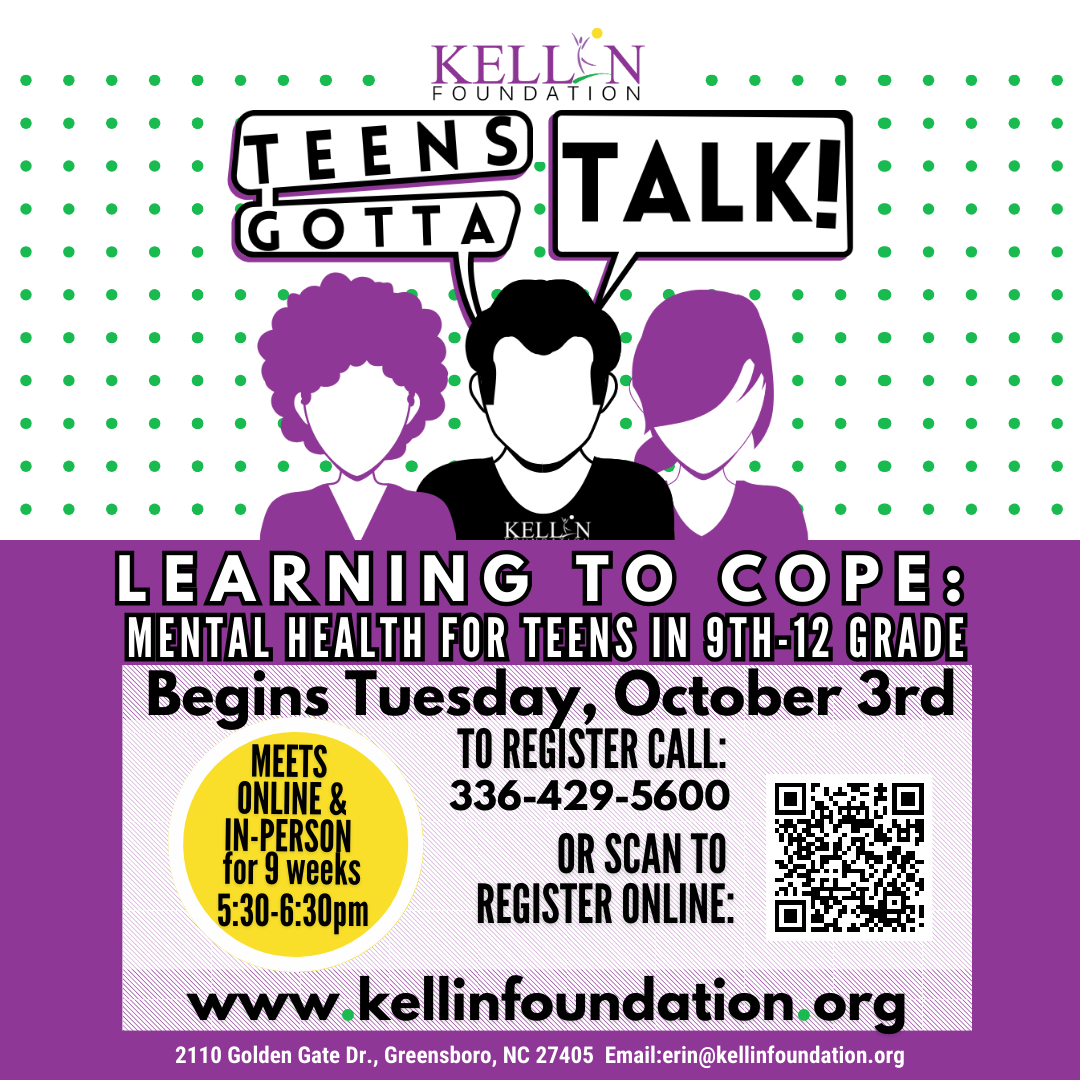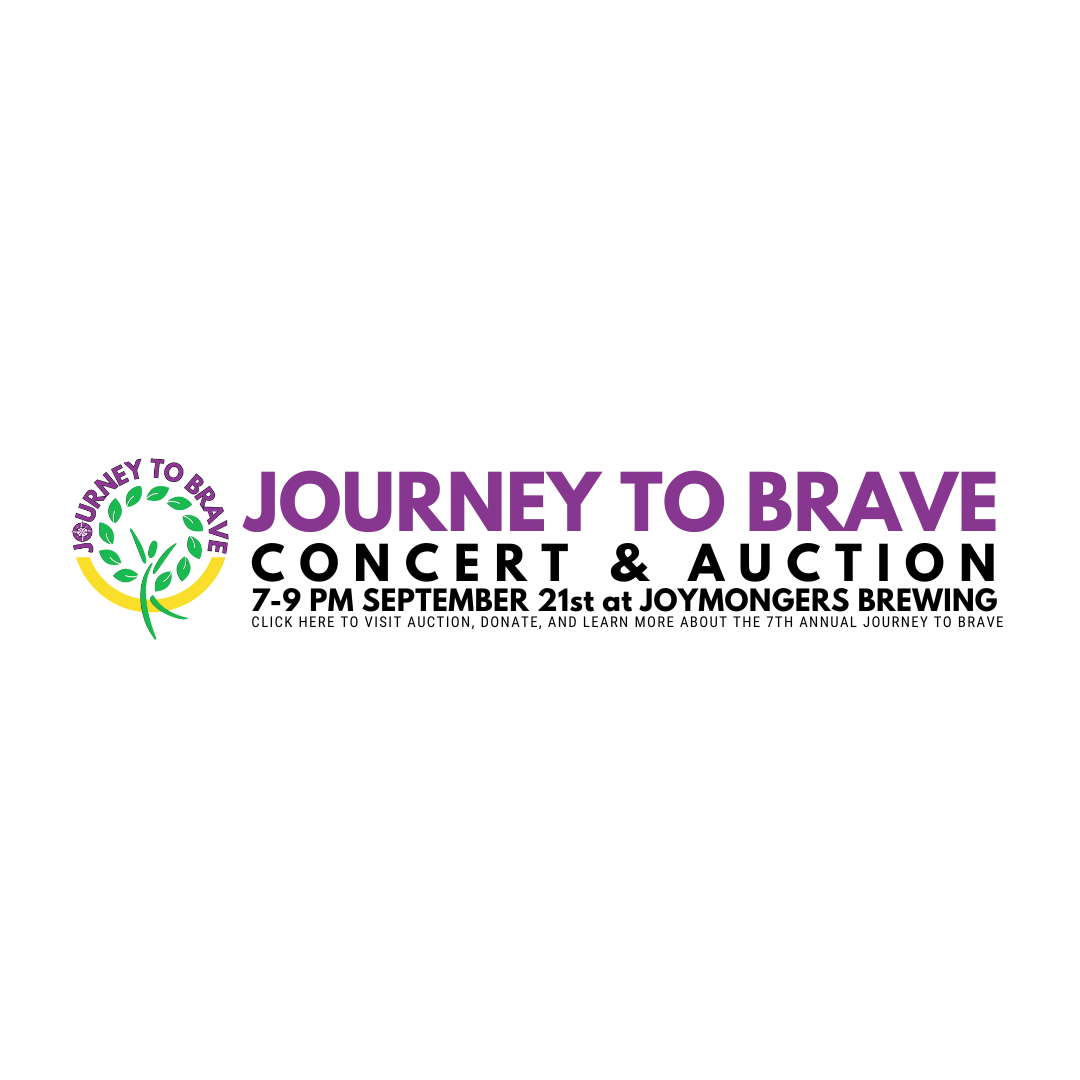Kellin Foundation "Teens Gotta Talk" after-school program set to begin in October
Teens Gotta Talk is a nine-week program designed to be an enriching and transformative experience for participating high school students. The program provides a safe and inclusive space where teenagers can openly discuss their thoughts, feelings, and concerns while building essential life skills and forging meaningful connections with their peers while focusing on stress management, self-esteem, and youth mental health & suicide prevention.
The Kellin Foundation’s Teens Gotta Talk program, is set to begin on October 3rd, 2023. The after-school program hosted both in-person at the local non-profit’s main office on Golden Gate Drive and online, is designed to empower and support the well-being of students in 9-12th grade as they navigate the complexities of adolescence.
Teens Gotta Talk is a nine-week program designed to be an enriching and transformative experience for participating high school students. The program provides a safe and inclusive space where teenagers can openly discuss their thoughts, feelings, and concerns while building essential life skills and forging meaningful connections with their peers while focusing on stress management, self-esteem, and youth mental health & suicide prevention.
Program Highlights:
Weekly Sessions: Teens Gotta Talk will meet every Tuesday at the Kellin Foundation starting on October 3rd, and continue for nine consecutive weeks. Each session will run from 5:30 PM to 6:30 PM, making it accessible to students after their regular school day.
Empowerment: Participants engage in interactive discussions, activities, and workshops that foster self-confidence, resilience, and emotional intelligence. Through guided conversations, they will develop effective communication skills and learn strategies to address various challenges they may encounter.
Peer Support: The program encourages students to form connections with their peers, share experiences, and create a supportive network. It aims to reduce feelings of isolation and promote a sense of belonging.
Professional Guidance: Teens Gotta Talk is guided by a seasoned and certified NC Peer Support Specialist with a specialization in adolescent mental health and well-being. Their support will offer mentorship and create a secure environment for students to openly express themselves.
Holistic Growth: In addition to emotional and social development, the program will explore topics such as stress management, goal setting, and decision-making to help participants thrive academically and personally.
"The teenage years can be a challenging and transformative period in a young person's life," said Erin Hanes, Kellin Foundation peer support specialist and facilitator of the program. "Our Teens Gotta Talk program aims to provide high school students with the tools they need to navigate these years successfully. We believe that open communication, peer support, and personal growth are essential for their overall well-being."
Ms. Hanes, a dedicated member of the Kellin Foundation team, is known for her commitment to the well-being of youth and families in our community. With a passion for making a positive impact, Erin brings a wealth of expertise in youth development and mental health support to her role. Her compassionate approach and strong interpersonal skills make her a valuable asset in fostering a nurturing environment for those she serves.
Participation in the program is open to all high school students in 9th-12th grades, and there is no cost to enroll. Interested students and parents can register online at www.kellinfoundation.org/teens-gotta-talk-fall-2023 or by contacting the Kellin Foundation at info@kellinfoundation.org.
The Kellin Foundation is committed to fostering the emotional and social development of youth in our community, and Teens Gotta Talk is a testament to this commitment. By offering a nurturing and empowering environment, the Foundation aims to help high school students flourish, grow, and build the skills they need to succeed in both their academic and personal lives.
The 2023 Journey to Brave Auction is LIVE!
The 2023 Journey to Brave Auction is open and ends September 21st at 9 PM. Bid on items like vacation stays, event and attraction tickets, gift baskets and more. Join us September 21st from 7-9 PM at Joymongers for a concert by Camel City Yacht Club and the culmination of the online auction! Proceeds raised from Journey to Brave benefit the behavioral health and substance use counseling, peer support, community outreach, and wraparound wellness services the Kellin Foundation provides each year to over 12,000 children, adults, and families in our community.
The Kellin Foundation's annual Journey to Brave concert and auction is a celebration of community, generosity, and the power of coming together to make a difference. As the virtual gavel drops and bids begin, (THE AUCTION IS OPEN!) we invite you to embark on this journey with us.
Imagine gazing out over the tranquil waters of Ocean Isle during a week-long getaway or losing yourself in the serene beauty of Smith Mountain Lake. These are just a couple of the items up for bid and dreams waiting to be realized as part of the 2023 Journey to Brave silent.
But it's not just about picturesque escapes. Sports enthusiasts will find their own treasures in exclusive sports memorabilia, while foodies can tantalize their taste buds with gift certificates to local restaurants. Gift baskets filled with surprises and tickets to sought-after events and attractions round out a catalog that promises something for everyone.
The excitement is already underway, with the auction officially opening its virtual doors at 8 AM today. Mark your calendars for the grand finale, the Journey to Brave Concert at Joymongers, on September 21st, at 9 PM.
Each bid placed in the 2023 Journey to Brave Auction is more than just a number; it's a spark of hope. The funds raised directly support the Kellin Foundation's mission to provide essential counseling, peer support, and wraparound wellness services to over 12,000 children, adults and families in our community.
When you participate in this auction, you become an agent of change, contributing to the growth and development of a brighter future for those who need it most.
The 2023 Journey to Brave Auction isn't just a fundraiser; it's a shared experience that unites us in our mission. Here's how you can get involved:
Bid and Win: Visit our ONLINE AUCTION to explore the full range of items and start bidding.
Spread the Word: Share this exciting opportunity with your friends, family, and colleagues. Together, we can amplify our collective impact.
Save the Date: Circle September 21st on your calendar and join us for the Journey to Brave Concert at Joymongers Brewing in downtown Greensboro, where we'll celebrate our shared journey toward a brighter tomorrow dancing along to our favorite hits performed by Camel City Yacht Club.
In a world where challenges can seem insurmountable, Journey to Brave is a testament to the incredible things we can achieve when we come together. With every bid, we build a better tomorrow for our community, one filled with hope, support, and the promise of a brighter future. Join us on this incredible journey, and together, let's unlock hope for those who need it most.
Discover Light on Your Journey: Introducing the Lighthouse Support Group by Kellin Foundation
Life's challenges can sometimes cast a shadow over even the brightest spirits. Navigating through the depths of depression is an experience that many young adults face, and finding a guiding light in those moments can make all the difference. That's why we are thrilled to introduce the Lighthouse Support Group by Kellin Foundation – a beacon of hope for young adults aged 18-25 seeking understanding, connection, and healing.
Life's challenges can sometimes cast a shadow over even the brightest spirits. Navigating through the depths of depression is an experience that many young adults face, and finding a guiding light in those moments can make all the difference. That's why we are thrilled to introduce the Lighthouse Support Group by Kellin Foundation – a beacon of hope for young adults aged 18-25 seeking understanding, connection, and healing.
What is Lighthouse?
Lighthouse is a unique depression support group crafted with care for young adults aged 18-25. Starting September 7th, this empowering initiative is available both virtually and in-person at Kellin Foundation, ensuring accessibility and flexibility for all participants within this age range. We understand that every individual's journey is distinct, which is why we've designed Lighthouse to cater to various preferences and comfort levels.
Why Lighthouse?
At Kellin Foundation, we believe in the transformative power of community. Lighthouse is not just another support group; it's a lifeline of compassion, camaraderie, and growth specifically tailored to young adults aged 18-25. By sharing your experiences and hearing the stories of others, you'll find solace in knowing that you're not alone on this path. Our expert facilitators will guide you through discussions that explore coping strategies, self-care, and the pursuit of happiness.
Joining the Lighthouse Community
Whether you're located near our foundation or a few miles away, you can become a part of Lighthouse. The virtual sessions provide a space for connection regardless of your Guilford County address, while the in-person meetings at Kellin Foundation offer a chance to bond face-to-face with fellow participants.
How to Participate
To embark on this journey of self-discovery and resilience, simply register for the Lighthouse Support Group through our website. The journey begins on October 5th, so mark your calendars and get ready to let your light shine brighter than ever.
In a world where hope can sometimes feel distant, the Lighthouse Support Group stands as a reminder that together, we can illuminate the path to healing for young adults aged 18-25. Let's find strength in each other's stories, celebrate our victories, and navigate the seas of life with newfound hope.
The Transformative Impact of Dr. Kelly Graves and the Kellin Foundation: Empowering Trauma-Informed Justice and Health Policy in North Carolina
Under Dr. Kelly Graves's visionary leadership, the Kellin Foundation has been instrumental in driving positive change and making a tangible impact throughout North Carolina. With a steadfast commitment to trauma-informed practices, the foundation has been at the forefront of fostering resilience and healing for individuals and communities affected by trauma. Through innovative programs, educational initiatives, and community partnerships, the Kellin Foundation has been able to provide crucial support and resources to those in need. The foundation continues to create a ripple effect, empowering individuals and promoting a culture of understanding, compassion, and healing across the state. Through their comprehensive approach and unwavering dedication, the Kellin Foundation, under Dr. Graves's leadership is actively shaping a brighter future for North Carolina.
Dr. Kelly Graves, executive director of the Kellin Foundation, whose passion for trauma-informed practices and a dedication to improving the well-being of North Carolinians, has recently been recognized for her exceptional contributions in two significant initiatives.
North Carolina ACES-Informed Courts Initiative: Dr. Kelly Graves received the honor of being selected to participate in the North Carolina ACES-Informed Courts initiative commissioned by Chief Justice Paul Newby and led by District Attorney Benjamin David. This initiative aims to implement Adverse Childhood Experiences (ACES)-informed practices within the state's judicial system. On June 19, 2023, Dr. Graves took part in the New Judges Orientation Program organized by the Duke Bolch Institute. She had the opportunity to share invaluable insights, tips, and tools with newly appointed judges from across the state. By fostering a deeper understanding of trauma and resilience, Dr. Graves is helping to equip judges with the necessary tools to ensure fairness, empathy, and justice prevail in their courtrooms.
NC Institute of Medicine (NC IOM) Editorial Board: Dr. Graves also recently was selected as one of only six individuals across the state to join the esteemed NC Institute of Medicine (NC IOM) Editorial Board. The NC IOM plays a pivotal role in improving the health and well-being of North Carolinians by providing analysis on health issues, identifying evidence-based solutions, and informing health policy at both state and local levels. Dr. Graves' inclusion on the board further exemplifies her unwavering commitment to the betterment of the community and her expertise in shaping health policies for the benefit of all.
Under Dr. Kelly Graves's visionary leadership, the Kellin Foundation has been instrumental in driving positive change and making a tangible impact throughout North Carolina. With a steadfast commitment to trauma-informed practices, the foundation has been at the forefront of fostering resilience and healing for individuals and communities affected by trauma. Through innovative programs, educational initiatives, and community partnerships, the Kellin Foundation has been able to provide crucial support and resources to those in need. The foundation continues to create a ripple effect, empowering individuals and promoting a culture of understanding, compassion, and healing across the state. Through their comprehensive approach and unwavering dedication, the Kellin Foundation, under Dr. Graves's leadership is actively shaping a brighter future for North Carolina.
Enhancing Child-Parent Relationships: The Power of Kellin Foundation's PCIT Program
In today's fast-paced world, building strong and nurturing relationships between parents and children has become more important than ever. Recognizing this need, the Kellin Foundation has partnered with Harvard University's Baker Center for Children and Families to implement a Parent-Child Interaction Therapy (PCIT) program, one of only two practices in our region utilizing the method. PCIT is a highly effective approach that has gained immense popularity and strengthens familial bonds.
In today's fast-paced world, building strong and nurturing relationships between parents and children has become more important than ever. Recognizing this need, the Kellin Foundation has partnered with Harvard University's Baker Center for Children and Families to implement a Parent-Child Interaction Therapy (PCIT) program, one of only two practices in our region utilizing the method. PCIT is a highly effective approach that has gained immense popularity and strengthens familial bonds.
Understanding PCIT:
Parent-Child Interaction Therapy (PCIT) is an evidence-based treatment approach designed to enhance the quality of parent-child interactions and improve child behavior management skills. Developed by Dr. Sheila Eyberg in the 1970s, PCIT focuses on two essential components: Child-Directed Interaction (CDI) and Parent-Directed Interaction (PDI). Through a combination of play therapy and behavioral techniques that involve both parent and child participation, PCIT equips parents with the necessary tools to establish positive connections and effectively manage their child's behavior.
Parent-Child Interaction Therapy (PCIT) has been found to be particularly effective for children in the age range of 3 to 7 years old. This developmental stage is characterized by significant growth in social, emotional, and cognitive domains. During this period, children are actively exploring their environment, acquiring essential communication skills, and forming their understanding of relationships. PCIT's structured and play-based approach aligns well with the developmental needs of children in this age group, providing them with a safe and supportive environment to learn and practice new skills. By targeting specific behaviors and strengthening the parent-child bond, PCIT helps children navigate challenges, improve their social and emotional competence, and develop a solid foundation for healthy relationships in the future. While PCIT can benefit children of various ages, its focus on enhancing parent-child interactions and behavior management skills aligns particularly well with the needs of children between 3 and 7 years old.
Benefits of Kellin Foundation's PCIT Program:
1. Improved Parenting Skills: PCIT empowers parents with practical strategies to foster positive communication, reduce negative interactions, and effectively manage challenging behavior. The Kellin Foundation's program provides parents with personalized guidance and support, enabling them to develop crucial parenting skills that contribute to a nurturing environment.
2. Strengthened Parent-Child Bond: By focusing on positive reinforcement and building strong connections, PCIT strengthens the emotional bond between parents and children. The Kellin Foundation's therapists work closely with families, fostering a safe and supportive environment that enhances trust, empathy, and understanding between parent and child.
3. Enhanced Child Behavior: PCIT addresses behavioral issues by teaching parents effective behavior management techniques. By promoting consistency, clear communication, and appropriate discipline, the program assists parents in reshaping their child's behavior in a positive manner. Through PCIT, children learn essential social and emotional skills that contribute to their overall development.
4. Long-term Positive Outcomes: Research has consistently shown that PCIT leads to lasting improvements in parent-child relationships. The Kellin Foundation's PCIT program is built on evidence-based principles, ensuring that families receive the highest quality of care and support. By equipping parents with lifelong skills, the program creates a positive ripple effect that extends beyond therapy sessions.
The Kellin Foundation's PCIT program stands as a testament to the transformative power of strong parent-child relationships. By providing parents with effective tools to enhance their parenting skills and promote positive interactions, PCIT offers families a path towards long-lasting and meaningful connections. The Kellin Foundation's dedication to this program reinforces its commitment to improving the lives of children, strengthening families, and fostering resilience in our communities. If you're seeking to cultivate a more harmonious and fulfilling relationship with your child, the PCIT program offered by the Kellin Foundation may be the key to unlocking a brighter future for your family.








